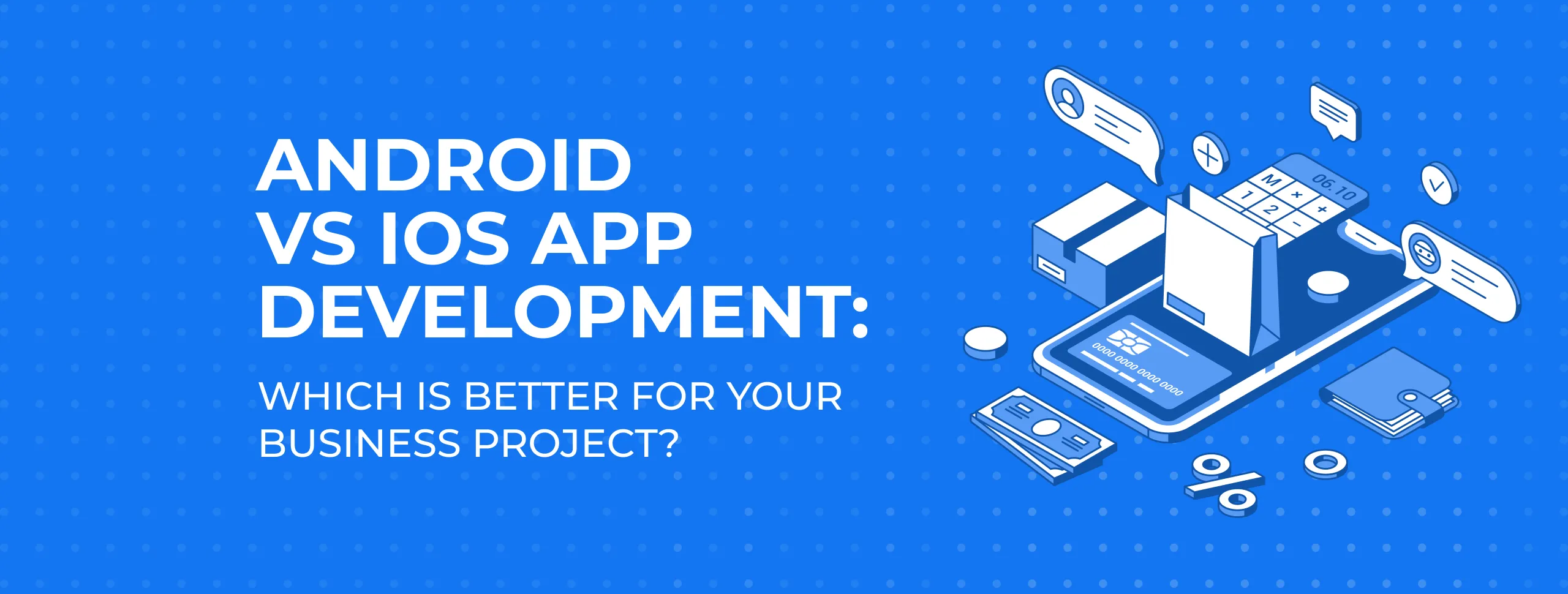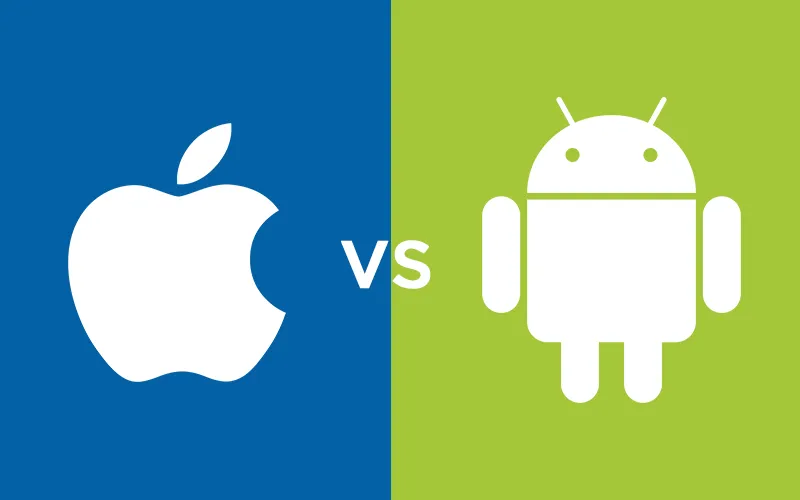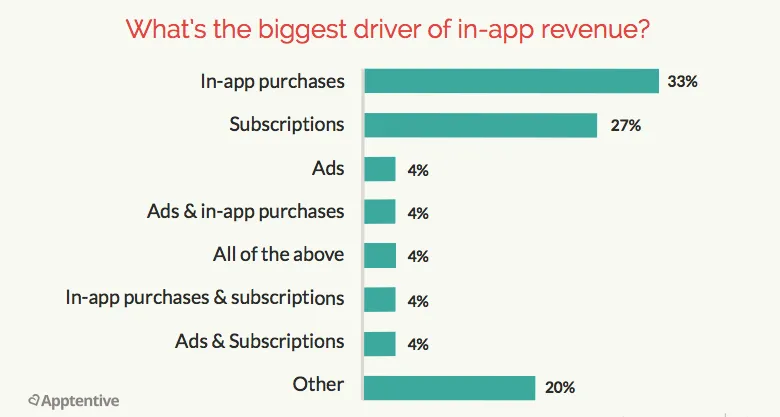
Android vs iOS App Development: Which is Better for your Business Project?

Planning to create your money-making mobile app? Choosing between iOS, Android and a hybrid solution and not sure which way to go? This post will help you understand what to pay attention to when choosing the OS for your business app.
There are two types of smartphone users in the world:
passionate advocates of iOS and no-less-avid Android lovers. Together they comprise 99% of the mobile app consumers' market share.
Depending on your target audience, you should choose one of these platforms to place your bets.
What is an operating system?
Before comparing Android with iOS, which we call operating systems or OS, let’s take a look and what exactly an OS is.

A mobile operating system is pre-installed on your phone’s system software. It can be described as an environment in which all the apps run.
It bears responsibility for the proper functioning of the features available on your devices, such as keyboards, cameras, data synchronisation, text messaging and more. It also determines the third-party APIs (application program interfaces) that can be utilised on your device.
iOS is an operating system applied only by Apple. All the devices they release, including smartphones, smartwatches, laptops and computers, run different versions of this operating system.
Android, meanwhile, is an open-source OS made by Google. This means it’s being installed by various mobile phone producers all over the world.
For example: Huawei, Sony, HTC, Motorola and so on.
Both companies regularly tweak their OS to keep them agile and up-to-date. Both of them are well-supported. However, iOS has traditionally been more polished and less buggy. It is also more secure and does not allow third-party APIs to access your personal information without your permission. In the case of Android, everything is less transparent.
Differences between Android and iOS
You can find a comparison table of different operating systems here. Let’s have a closer look at how iOS and Android differ.
Target Audience Values
Price
- The majority of iPhone holders are businessmen or people with a high income – they can buy a device without looking at the price.
- Android is preferred by more democratic people whose mantra is “value for money”.
Prestige
- Some people choose iOS over Android first and foremost because of its premium brand positioning. For them, the most important thing is to confirm their social status.
- At the same time, Android is chosen by those who need a reliable and supported device without throwing money away.
Quality
- The execution of Apple mobile devices has always been at the top as far as design, assembly and components are concerned. The apps run swiftly and smoothly. Aside from functionality, iOS is always the leader in security.
Apple gadgets attract the most tech-savvy audience, and up until recently have been the first to implement the most technologically advanced digital solutions. However, following the appearance of a foldable phone built by Samsung, the iPhone’s position on the market is at risk.
- With Android, the quality of the device can be very unstable depending on the manufacturer and price bracket.
Ecosystem
According to statistics, a great number of people remain loyal to the OS they had on their first device.
This can be explained very easily:
the OS have different logic and once you’re used to Android, for example, you won’t want anything else. This simple fact motivates us to continue buying things like desktops, laptops and so on from the same brand.
An ecosystem is a cloud connection between different devices that makes the transition from one to another quick and easy. For example, if you need to upload photos from your phone to a computer, you don’t have to use a cable or even Bluetooth like in old times – just use the cloud.
Android and iOS devices don’t get along particularly well. Remaining loyal to one operating system becomes a must if you’d rather avoid downloading multiple converters onto each of your devices.
Business factors:
Speed of development
- iOS development takes less time, as historically it’s a platform developed especially for mobile devices.
Some reasons for this:
- less complicated testing procedures. There are very few iOS phones in circulation compared to the multi-branded variety of Android-based smartphone screens.
- some advanced functionality, such as AR/VR, can be easily integrated into iOS
Apple developers are constantly improving the Integrated Development Environment (IDE) to keep it convenient for programmers to use. And it works.
- Android as a resource is less consistent and more buggy. Hundreds of companies and individuals contribute to its open libraries every day, so it’s easy to get lost in the number of different tools or catch a bug.
App stores
- The total number of apps published on the Google Play Store for Android is 2.1 million.
- About 1.8 million are available for iOS.
- The total number of downloads comes to 17 billion for Android and about 7 billion for iOS.
- The amount of money spent in the App Store is about $11 billion.
- More than $5 billion has been spent by users in the Google Play Store.
- To publish your app on the Google Play Store, you need to register as an Android developer and pay a $25 fee each time you post an app.
- The iOS App Store offers an annual subscription that costs $99.
An additional important nuance of the app stores is not so much their size or subscription fees but the process of approval.
App Store has very strict policies and will not allow you to publish your app in the event of any iOS standard guideline violations being found. Every app is checked by a person and approval takes about a week. For users, this acts as an additional guarantee of a professionally-coded and well-functioning app.
Approval in the Google App Store can take much less than one working day. The applications are tested automatically and the apps released.
Monetisation
Surprisingly, different monetisation strategies work better for different OS.
For example:
- iOS users are reported to be more inclined to spend money on apps. Apple devices usually belong to people with a rather high income. They can also be called perfectionists with a clear idea of what they want and who demand perfect quality from the apps they use. This is why they’re more keen to use paid apps or make purchases within the app.
Comparison of App Consumers Expenditures
- Android devices are seen by the majority as a budgetary solution. Its users spend less money in app stores. Among the preferred models of monetisation are ad pop-ups and freemium.
- Ads let you monetise your app even if it's free.
- Freemium is a perfect way to show to your clients that your product has value. It should be a fully-functioning application with more elite features that can be paid for. When the owner conceals too many of the features, the product seems boring and useless and users won’t be coming back.

Read in more detail about app monetisation here.
Which one to choose
Nobody knows your customers better than you. So, no ready answer here.
You could start with a hybrid app. Despite being cheaper and running on any OS, it’s not always the best choice – especially keeping in mind that you’ll have to pay three times if and when you settle on iOS and Android. Read about the major drawbacks of this approach here. Finally, a well-written native app for Android or iOS is, regardless, a nice acquisition for your business.
If the majority of your clients use Android, then this is the right choice. Your solution will be in demand. The same goes vice-versa: if more than half of your clients use iOS, choose to develop for it – or, at least, set your Apple app as a priority.
If you’re getting ready to code an app, check out our step by step instructions on mobile development.
If you have any questions about your project, feel free to contact us at any time.





